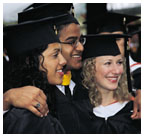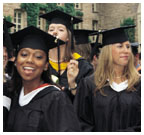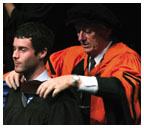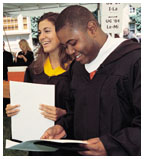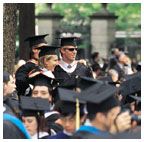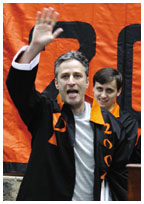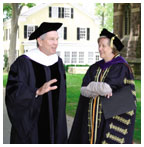July 7, 2004: Features
FRIENDS
The procession begins From left, Kristen Williams, Anne Evans, and Alexandra Dacosta. NEW HOOD
LAST PAPER
ABOVE THE CROWD |

Commencement 2004
Photographs by Ricardo Barros
As Steven Kamara ’04 stood in line behind Nassau Hall waiting for Commencement to begin, he pondered what life after Princeton would be like in the post-September 11 world. A politics major who will start a travel company with two classmates, Kamara thought of how Princeton students – absorbed in intellectual pursuits and college friendships — have been removed from the goings-on in the world. This, he said, will “make the transition to the new real world even more salient.”
That transition was also on the mind of President Tilghman during Princeton’s Commencement June 1. Speaking above the hum of cicadas, Tilghman reminded graduates of the Commencement of 1970, which – like this year’s – took place during a war that divided Americans and “raised fundamental questions about our policies and values.” Princeton has instilled in students the qualities of an educated citizen, Tilghman said, and she urged graduates to vote and to engage “with the momentous issues of your day,” just as their predecessors in the Class of 1970 had done. She encouraged advanced-degree recipients not only to publish scholarly books, but to “write op-ed pieces and columns in newspapers, give public lectures, advise members of your local, state, and federal legislatures, and speak to both primary school students and senior citizens’ groups. In other words, I urge you to use your fine education at this prestigious university to serve your country, whichever country that may be, and the world; and the common human values that we cherish.”
During the ceremony, 1,790 students were awarded degrees: 1,104 received bachelor’s degrees; 404, master’s degrees; and 282, doctorates. About 43 percent of the Class of 2004 graduated with honors.
Valedictorian Ruth Tennen, who majored in molecular biology, reflected on her professors’ encouragement to challenge the status quo. She recalled how a professor asked students to critique journal articles written by leaders in the field, and how she was at first reluctant to criticize the work of intellectual superiors. But she thanked her teachers for insisting that students “confront traditional thinking with a critical eye.”
Teachers were honored in many ways. Four New Jersey secondary-school teachers received awards for their classroom accomplishments, while four Princeton faculty members — Jeremy Adelman (history), John Fleming *63 (English), Alison Gammie (molecular biology), and James Sturm ’79 (electrical engineering) — received the President’s Awards for Distinguished Teaching.
Walking out through FitzRandolph Gate, some graduates had clear paths before them. Anthony Costanzo ’04, a singer and actor who has appeared on Broadway and in Carnegie Hall, will continue to perform professionally, as he did during college. “I can remember at least a few term papers that were completed in the wings during a rehearsal,” says Costanzo, who this summer will sing in Italy and New York. Denis Barkats *04, who earned a Ph.D. in physics, is heading to the California Institute of Technology for a postdoctorate in astrophysics, and will work on an experiment in Antarctica to observe radiation left over from the hot, dense state of the early universe.
Like Barkats, many graduates seemed both pleased and relieved to be
finished with their studies – for now, at least. “I can’t
believe it’s over,” said Amelia Robertson ’04, an English
major, “and I’m ready for it to be over.” ![]()
By K.F.G.
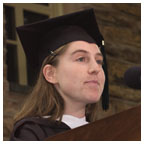 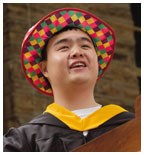 |
Student speakers
Valedictorian Ruth Tennen applauded her classmates and thanked her teachers: “Thank you, teachers for allowing us to challenge – or rather, insisting that we challenge. Teachers who are secure enough in their own intellectual prowess that they are neither impatient with simple questions nor threatened by brilliant ones. Teachers who have given us the confidence to question our intellectual superiors, challenge the status quo, and find solutions that defy traditional thinking.”
Wearing a colorful clown hat, salutatorian Brian Tsang, a computer science major, gave the traditional Latin address. He saluted President Tilghman, the trustees, the faculty and staff, and his fellow students. “If they do not already know,” he said, “the greatest thanks goes to our parents, sine quibus non (without whom nothing would be). Hail and farewell.”
Photo by Denise Applewhite |
Class Day: Laughs for Stewart
“There’s something we need to tell you about the real world,” said Class Day speaker Jon Stewart, comedian and host of The Daily Show. “I don’t know how to put this so I’ll be blunt. We broke it.” Stewart encouraged class members to repair the world and become “the next greatest generation.” A Hoagie Haven devotee and “townie” from nearby Lawrence Township, Stewart is the brother of alumnus Larry Leibowitz ’82. Stewart and his wife are expecting their first child in July; when asked whether his child might attend Princeton, Stewart said, “He’s tested poorly so far, but we’re crossing our fingers.”
Photo by Evelyn Tu |
Baccalaureate: McPherson’s parting words
In his Baccalaureate address, history professor James McPherson, who is retiring after 42 years on the faculty, and is shown here with President Tilghman, advised students to take a long view of life: “Take heart. These are perhaps not the best of times to graduate. But neither are they the worst of times. Most of your student days have been lived in the shadow of 9/11. But from that experience you have gained the perspective to endure both the good and the bad times that will come in the future . . . It did touch your hearts with fire and teach you that life is a profound and passionate thing. Generations that have gone before have been similarly touched. They responded to the challenges with courage and creativity. I am confident that you will do the same.”
From left, President Tilghman with 2004 honorary degree recipients Pablo Eisenberg, Charles Kao, Nannerl Keohane, Robert Moses, and Edward Cone. (Photo by Denise Applewhite) |
Honorary degree recipients
Five people received honorary degrees in recognition of their achievements. (Italicized quotes are from their citations.)
EDWARD T. CONE ’39 *42, DOCTOR OF HUMANE LETTERS: Concert pianist, composer, author, and Princeton professor of music emeritus. The knowing beauty of his compositions, the graceful power of his piano playing, and the inviting elegance of his critical essays teach us to think well of music’s place in human affairs. If his genial voice remains the melody so many of us hear when we ponder music, his unceasing devotion to Princeton is a harmony that makes us all sound better.
PABLO EISENBERG ’54, DOCTOR OF LAWS: Social-justice activist, former tennis pro, and fellow at Georgetown University. He chose an unsettled, and unsettling, life, battling in the trenches for social justice and community change, and challenging the privileged and the powerful to make sustainable investments in the underprivileged and the powerless. . . . Armed with intellectual energy and a persuasive persistence, he has demonstrated to leaders in the nonprofit world that giving funds to those who work at the grass roots is as important as getting funds from those who play on the grass courts.
CHARLES KUEN KAO, DOCTOR OF SCIENCE: Internationally known pioneer in fiber-optical research and transmission systems, which now serve as the backbone of major communication routes in the world. He has been called the “father of fiber optics” – the discovery that put “instant” into instant messenger, “electronic” into electronic commerce, “cell” into cell phone, and “world” into the World Wide Web. . . . He has led a determined and farsighted search, not only for more and faster information, but for knowledge, and for the application of knowledge to make the world a better, and a better connected, place.
NANNERL O. KEOHANE, DOCTOR OF LAWS: Political scientist and Duke University’s first woman president, who stepped down in June. A political scientist by training and a humanist by disposition, she is an adept listener, an adroit leader, and a passionate advocate for human rights and equal opportunity. . . . Like her beloved basketball teams, she is consistently on target, agile, disciplined, and powered by a firm commitment to excellence.
ROBERT P. MOSES, DOCTOR OF LAWS: Teacher and civil rights leader, who helped organize the Mississippi Summer Project of 1964 to register black voters and protest racial discrimination. Later he developed the concept and curriculum for the Algebra Project, which has helped tens of thousands of students in urban and rural school districts develop essential mathematical skills. His goal is to provide all citizens with the tools they need for effective citizenship, knowing that the whole that draws on the skills and talents of all citizens will be greater than the sum of unfairly unequal parts.

